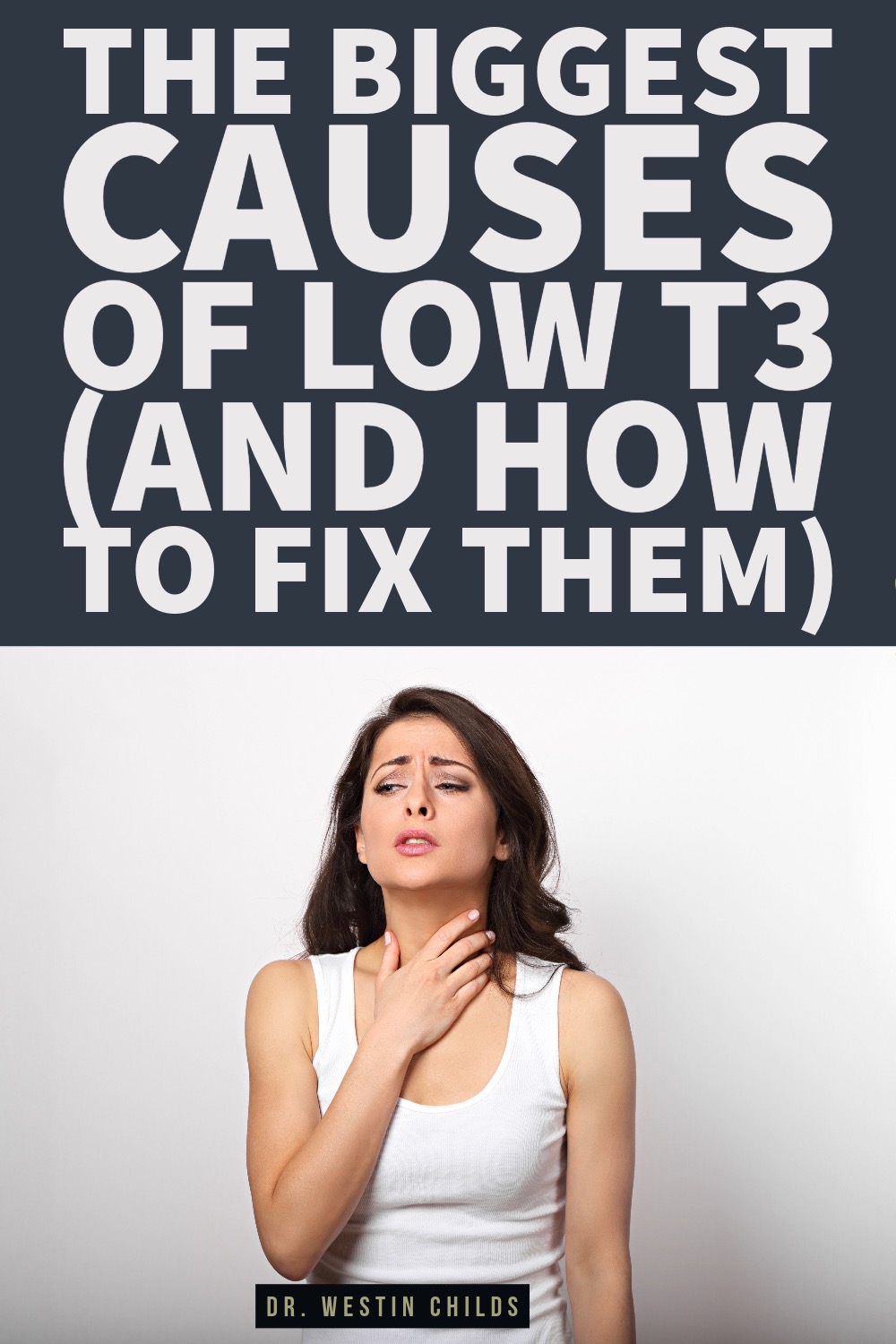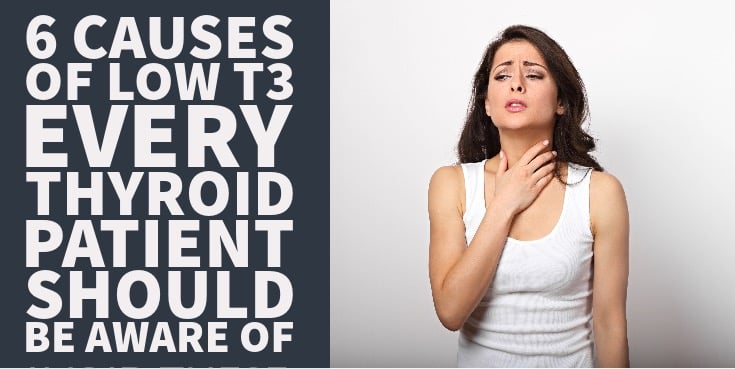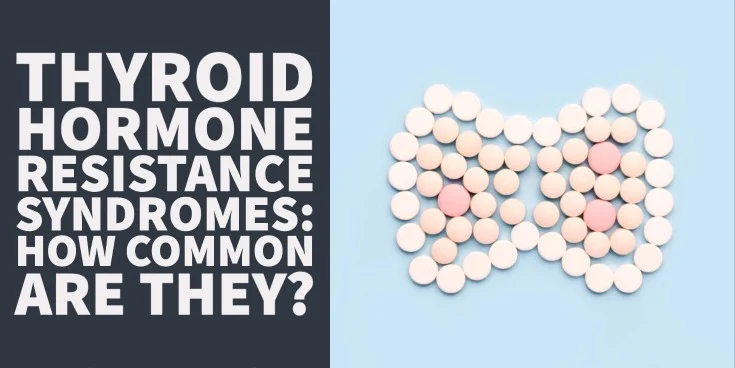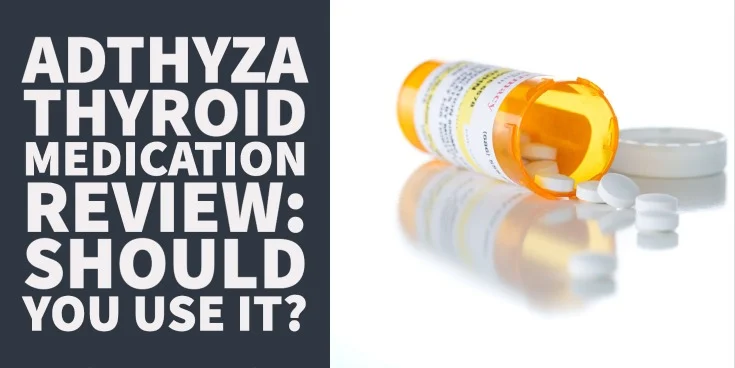T3 thyroid hormone is one of the most important thyroid hormones out there.
This doesn’t mean that T2 or T4 aren’t important, because they are, but you still have to recognize that most of the activity at the thyroid hormone receptor comes from T3.
This means all of the things that you want your thyroid to do like help your hair grow, boost your metabolism, help you feel happy and less moody, and so on, all come from the actions of T3.
For this reason, maintaining adequate T3 serum levels should be your top priority!
Which is why today we are going to talk about the most common causes of low T3 so that you can protect your T3 levels and ensure that you feel your very best.
And #1 on that list is…
DOWNLOAD FREE RESOURCES
Foods to Avoid if you Have Thyroid Problems:
I’ve found that these 10 foods cause the most problems for thyroid patients. Learn which foods you should avoid if you have thyroid disease of any type.
The Complete List of Thyroid Lab tests:
The list includes optimal ranges, normal ranges, and the complete list of tests you need to diagnose and manage thyroid disease correctly!
#1. Thyroid Gland Problems
Problems with the thyroid gland are by far the most common cause of low thyroid problems and the reason is simple:
If your thyroid gland isn’t working then it won’t be able to do its job which is to produce hormones.
And if your thyroid gland can’t produce thyroid hormones then those thyroid hormones will fall in the blood and you will end up hypothyroid.
This concept is straightforward but what isn’t as straightforward is how your body gets T3.
When you look at those numbers you see something very interesting:
The vast majority of thyroid hormone produced by the thyroid gland is in the form of T4 and this number ranges anywhere from 80 to 90% depending on which study you look at (1).
This leaves only about 10-20% leftover which is the amount of T3 produced by the thyroid gland each day.
Even though the thyroid gland isn’t a major producer of T3, it is a major producer of the thyroid hormone that eventually turns into T3.
Which is why, even though it may be a little counterintuitive, thyroid gland problems often result in low T3.
This brings us to #2 which is…
#2. Decreased T4 to T3 Conversion
You can expect the healthy thyroid gland to produce around 30 mcg of T3 each day.
Of this 30 mcg of T3, only around 5 mcg are created directly by the thyroid gland, and the rest (about 25 mcg) is created through T4 to T3 conversion (2).
Remember:
The majority of thyroid hormone produced by the thyroid gland is in the form of T4 and the majority of T3 created by the body comes from the conversion of T4 into T3.
You may need to hear that a couple of times for it to sink in so make sure to rewind if needed.
Now back to thyroid conversion for a second:
This conversion process occurs when the body uses enzymes to remove iodine molecules from T4 which then turns it into T3.
Because these enzymes can be found all over the body, and in different tissues, your body can create T3 when, and only when, it needs it.
But there’s one big problem:
There are a LOT of conditions that can interfere with this conversion process and act to either prevent it from happening or slow it down significantly.
Two of the biggest perpetrators of reduced T4 to T3 conversion are carbohydrate and calorie restriction.
Whether you are cutting back your calories because you want to lose weight or reducing your carbohydrate intake by following a keto or carnivore diet, both conditions can slow this process down thereby leading to low T3 (3).
What makes this particular problem more sinister is the fact that you’d never know it existed unless you are specifically looking for it.
The only way to identify thyroid conversion issues is by looking at a combination of free T3, total T3, and reverse T3 levels, which are lab tests not often ordered by doctors.
Standard thyroid lab tests like the TSH and free T4 won’t cut it and won’t tell you if this is an issue you are facing.
Given that most of the t3 that your body creates comes from thyroid conversion, and the frequency with which problems arise in this process, this is by far the most common cause of low T3.
Next on the list is…
#3. Relative T3 Deficiency (Thyroid Resistance)
Let’s recap real quick:
If your thyroid gland can’t produce thyroid hormone you’ll end up with low T3.
Likewise, If your body is unable to convert T4 into T3 you’ll end up with low T3 but through a different mechanism.
But what if your cells are resistant to T3 thyroid hormone? What then?
You won’t end up with low T3 in your blood per se, but you will end up with a functional low T3-like syndrome.
In other words, even though you technically have enough T3 floating around in your system so you won’t get flagged as having low T3, your cells are unable to use it so it’s as if it isn’t there at all.
This condition is known as thyroid resistance and it’s emerging as a common cause of thyroid dysfunction (4).

This resistance syndrome is not very different from other hormone resistance syndromes that exist out there such as insulin resistance, progesterone resistance, and leptin resistance.
The main difference is that thyroid resistance is not as well studied nor understood but there’s a lot of evidence that suggests it’s more important and more common than originally thought.
Right now, the best way to tell if this is an issue for you is to rule out all other causes first and then assess whether or not your symptoms persist.
If they do, and everything else looks good, thyroid resistance may be your primary issue.
#4. Illness or chronic medical conditions
Let’s imagine that your thyroid gland is working perfectly, that your thyroid can convert T4 into T3 just fine, and that your cells are perfectly sensitive to T3 but you have other chronic medical conditions like, perhaps, metabolic syndrome, obesity, or high blood pressure.
The presence of either acute or chronic and long-lasting, medical conditions, can negatively impact your thyroid lab tests.
This condition, known as non-thyroidal illness (5), is another common cause of low T3.
And, unfortunately, doctors aren’t sure what to make of it.
Some doctors will say that it’s a normal physiologic response to these conditions and doesn’t warrant any intervention or treatment.
But there are others, myself included, who think that it’s more than this.
The question is really, do you treat someone with low T3 caused by other non-thyroid problems or do you let them ride it out and simply monitor their labs?
It’s not clear whether the use of T3 thyroid medication is a good idea in this type of situation but I do know what is:
Ignore your thyroid and manage the other underlying conditions so they can relieve pressure on your thyroid.
If you are someone taking 3-5 prescription medications for medical conditions, there’s a good chance that changing your lifestyle can help you treat these problems and get off those medications.
Things like changing your diet, exercising regularly, reducing your stress, and sleeping more, can go a long way to improving your health and reversing these chronic diseases.
And I have free information that can help you do just that.
So if you think your medical conditions are causing a non-thyroidal illness, make sure to address them first.
That way, you don’t even need to worry about whether or not thyroid medication will be helpful or harmful in your specific case.
#5. Nutrient Deficiencies
If we look closely at the steps required for the body to adequately create and use T3 thyroid hormone, we see the necessity of vitamins at every level.
And, just like you might imagine, if there is a deficiency in any of these nutrients, your body’s ability to use T3 will suffer.
Take for instance the creation of thyroid hormone:
I already told you that problems with your thyroid gland can limit your production of T3, which is true.
And even though the most common cause of direct thyroid gland problems is the autoimmune disease Hashimoto’s, nutrient deficiencies are high up on that list as well.
Iodine, iron, and tyrosine are all needed by your thyroid gland to create thyroid hormone.
Deficiencies in tyrosine are not very common, but deficiencies in iodine and iron definitely are.
And these are just the nutrients required to create thyroid hormone.
Other minerals like zinc and selenium are required for your body to convert thyroid hormone and vitamin A is required for thyroid hormone cellular activity.
It would be one thing if deficiencies weren’t very common, which means their negative impact on thyroid function would be rare, but that’s not the case.
Based on research, 40% of Americans don’t get the vitamin A they need from their diet, 12% of the population is at risk for zinc deficiency (this number jumps to 40% in the elderly) (6), and 17% of premenopausal women are iron deficient.
These are not insignificant numbers and there are physiologic data to suggest that deficiencies in these vitamins and minerals may be a real cause of low T3 (7).
Fortunately, it’s really easy to resolve nutrient deficiencies so this is a cause of low T3 you won’t want to miss.
#6. Prescription Medications
There are tons and tons of medications that can interfere with your thyroid and some of them are prescribed for common conditions like depression and high blood sugar.
From thyroid hormone production to thyroid hormone conversion to even thyroid communication with the brain, prescription medications can negatively impact your thyroid in different ways.
And it’s my opinion that medications are a very common and often overlooked cause of low T3.
Here are just a few that you should be aware of:
Drugs that interfere with T4 and T3 levels include:
- Antidepressants (such as SSRIs)
- Lithium
- Iodide
- Amiodarone
- Pain medications and narcotics
- Beta-blockers
Drugs that interfere with TSH levels include (8):
- metformin
- Steroids
- Dopamine agonists
And Drugs that impact thyroid hormone binding and transport include:
- Estrogens in contraceptives and HRT
- Steroids
- And Non-steroidal anti-inflammatory medications like ibuprofen and aspirin
If you know or suspect that you have low T3 then make sure to take a look at your medications.
Even if you must take a prescription medication, there are almost always alternatives that don’t cause thyroid problems.
If you think that any of these problems may be impacting your T3 level then you will probably want to know how to naturally increase your T3 level.
And to do that, I’d recommend checking out this article next.
Now I want to hear from you:
Have you had your T3 levels tested? Are they low?
Do you suspect you have low T3?
Do any of the causes listed above apply to you?
Leave your questions or comments below!
Scientific References
#1. ncbi.nlm.nih.gov/books/NBK499850/
#2. ncbi.nlm.nih.gov/pmc/articles/PMC4699302/
#3. pubmed.ncbi.nlm.nih.gov/3051835/
#4. pubmed.ncbi.nlm.nih.gov/17383828/
#5. pubmed.ncbi.nlm.nih.gov/21724536/
#6. today.oregonstate.edu/archives/2009/sep/zinc-deficiencies-global-concern
#7. ncbi.nlm.nih.gov/pmc/articles/PMC3746228/
#8. ncbi.nlm.nih.gov/pmc/articles/PMC2784889/









